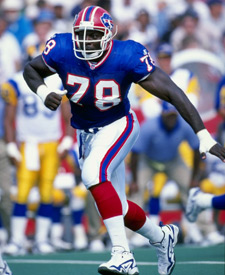Team History
The Buffalo Bills began their pro football life as the seventh team to be admitted to the new American Football League. The franchise was awarded to Ralph C. Wilson on October 28, 1959. Since that time, the Bills have experienced extended periods of both championship dominance and second-division frustration.
 The Bills' first brush with success came in their fourth season in 1963 when they tied for the AFL Eastern division crown but lost to the Boston Patriots in the playoffs. But in 1964 and 1965, they not only won their division but defeated the San Diego Chargers each year for the AFL championship. Head Coach Lou Saban, who was named AFL Coach of the Year each year, departed after the 1965 season.
The Bills' first brush with success came in their fourth season in 1963 when they tied for the AFL Eastern division crown but lost to the Boston Patriots in the playoffs. But in 1964 and 1965, they not only won their division but defeated the San Diego Chargers each year for the AFL championship. Head Coach Lou Saban, who was named AFL Coach of the Year each year, departed after the 1965 season.
Buffalo lost to the Kansas City Chiefs in the 1966 AFL title game and, in so doing, just missed playing in the first Super Bowl. Then the Bills sank to the depths, winning only 13 games while losing 55 and tying two in the next five seasons. Saban returned in 1972, utilized the Bills' superstar running back, O. J. Simpson, to the fullest extent and made the Bills competitive once again. That period was highlighted by the 2,003-yard rushing record set by Simpson in 1973.
But Saban departed in mid-season 1976 and the Bills again sank into the second division until a new coach, Chuck Knox, brought them an AFC Eastern division title in 1980. In 1981, Buffalo advanced to the playoffs again but lost to Cincinnati. The roller coaster ride for Buffalo fans then took another downturn with six straight non-winning seasons in the mid-1980s.
However, Marv Levy, who took over the coaching reins in 1986, quickly fashioned the Bills into one of pro football's truly dominant teams. Starting in 1988, the Bills won five AFC Eastern titles in six years and became the only team ever to play in four straight Super Bowls. Levy was inducted into the Pro Football Hall of Fame in 2001.
While three coaches -- Saban, Knox and Levy -- have been primarily responsible for the Buffalo's winning years, so too have a handful of superstar players been key factors in the Bills' successes. While Simpson was the key man in the winning years in the early 1970s, such stars as quarterback Jack Kemp, who later became a United States Congressman, fullback Cookie Gilchrist, defensive tackle Tom Sestak and Hall of Fame guard Billy Shaw played dominant roles in the 1960s. Levy's teams in the late 1980s and 1990s were powered by such perennial all-stars as quarterback Jim Kelly, running back Thurman Thomas and defensive end Bruce Smith.
Attendance demands forced the expansion of the Bills' first inner-city home, War Memorial Stadium, from 26,000 to 45,748 during the 13 seasons the Bills played there. In 1973, the Bills moved to Rich Stadium in suburban Orchard Park, NY. Buffalo fans set an NFL single-season attendance record of 635,889 in 1991. The Bills were purchased by Terry and Kim Pegula in 2014. They are just the second owners in the team's history.
The Bills have found recent success with new head coach Sean McDermott and quarterback Josh Allen. Since Allen and McDermott joined the Bills in 2018, they have boasted a 76-35 record (at start of 2025 season) and have won the AFC Eastern Division Title for the last five consecutive years. Allen earned MVP honors with the Bills in 2024 after leading the franchise to its second AFC Championship appearance in five years.